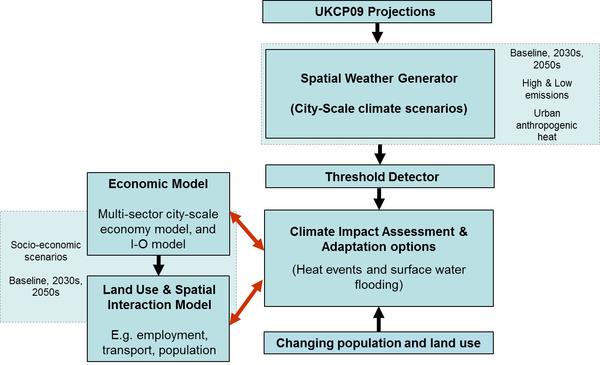ARCADIA: Adaptation and Resilience in Cities: Analysis and Decision making using Integrated Assessment
London’s climate risks reduced
Urban research led by Jim Hall at the Environmental Change Institute at the University of Oxford has developed a new system for analysing climate risks to cities. The ARCADIA project assesses choices for adapting City infrastructure to the impacts of climate change, using London as its case-study city.
ARCADIA (Adaptation and Resilience in Cities – Analysis and Decision-making using Integrated Assessments) is an evolution of the approaches pioneered for the Tyndall Urban Integrated Assessment System for incorporating data from different models and working alongside decision makers, such as the Greater London Authority, to ensure that the research outputs are useful to stakeholder’s needs.
Cities and urban areas are vulnerable to climate change because of their high concentrations of people and economic assets. “ARCADIA helps decisions about climate risks to the city economy, built environment, urban land-use and infrastructure” says Jim Hall.
“Cities globally are developing strategies for reducing the risks of climate change but they often lack the evidence that they need for informed decisions about what is likely to happen and where. ARCADIA provides a whole system approach for assessing adaptation strategies.”
A sister project, the Infrastructure Transitions Research Consortium (ITRC) is also led by Oxford. It analyses the impact of risks, including climate, on urban infrastructure networks such as energy, transport and IT.
ARCADIA incorporates the Tyndall partners at Oxford, Newcastle and Southampton for its climate, flood and sea-level models, and Cambridge for the economic analysis, joined with University College London for its modeling of the built environment and land-use change. It integrates these different models and data together in a framework for a whole system understanding of how they interact now and in the future.
Further information http://www.arcc-cn.org.uk/project-summaries/arcadia/
Adaptation and Resilience in Cities: Analysis and Decision making using Integrated Assessment (ARCADIA)
Urban areas are particularly vulnerable to economic and social impacts of climate change, such as floods, droughts and excessive heat, due to their high concentrations of people and assets. Moreover, the increasing temperatures due to global warming are exacerbated in cities due to the Urban Heat Island (UHI) effect. In recent years cities globally have been developing strategies for responding to the risks of climate change. However, they often lack the evidence needed to make the case for and prioritise adaptation actions. Consequently, the development of adaptation strategies for urban areas requires integrative thinking to understand and model relationships between the built environment, land-use, infrastructure systems, the urban economy and climate.
The ARCADIA project has developed a new system of models for analysing climate risks and assessing the performance of options for adapting to climate change. We have used London as a case study and worked with stakeholders to ensure that the analysis is relevant to the climate risks that they face. The models developed have been integrated within the Urban Integrated Assessment Framework (UIAF) (Figure 1). The UIAF incorporates future scenarios of climate, economic, demographic, and land use change, and starts to incorporate important feedbacks between these models. The framework enables the exploration of a range of climate and socio-economic scenarios and their implications, providing a whole-system approach to assessing adaptation strategies to enhance future urban sustainability.

Figure 1: Overview of the Urban Integrated Assessment Framework
The analysis is novel in a number of important respects including:
- A Spatial Weather Generator provides time-series of fields of weather variables at a 5 km and daily and hourly resolution, and includes spatial correlation of heat and rainfall. Temperature fields take some account of the Urban Heat Island effect, and allow the potential effects of different proportions of urban land cover and emissions of waste heat on urban climate to be explored. The Weather Generator is compatible with, and a valuable addition to, the UKCP09 climate scenarios.
- A probabilistic methodology has been used to generate risk estimates that incorporate the effects of uncertainties in climate and vulnerability. Whilst most urban studies have focussed upon climate impacts, we are now able to generate genuine probabilistic estimates of climate risks. This methodology has been used to assess the direct impacts of extreme heat and flooding on people, buildings and infrastructure.
- A novel input-output representation has been used to represent the effects of climate related disasters on the economy, and subsequent economic recovery from those disasters. The model represents the effects of disruption to supply chains and consumer demand that would result from a very severe event such as a widespread flood.
- A new model of future land use change, extending to the edge of the commuter belt around London, has been used to assess potential changes in vulnerability to climate change. Driven by changes in population and employment, the land use model provides an indication of the spatial distribution of future employment (by industrial sector) and population (by socio-economic class) within London, which in turn allows estimates to be made on the future land occupancy required by these competing groups.
- A complete model of the urban transport network has been used to estimate the potential disruptive effect of climate impacts on transport infrastructure, for example due to rail buckling in excessive heat. The transport model covers public and private transport modes.
A dynamic model of demand, service quality and switching between transport modes has been implemented to simulate the effects of transport disruptions on passenger flows.
- During the research programme we have held meetings and workshop with decision-makers in London to promote uptake of the research. Further interactions with stakeholders and researchers in related EPSRC projects have been facilitated by the Adaptation and Resilience to a Changing Climate Coordination Network http://www.arcc-cn.org.uk/.
In summary the ARCADIA project has developed:
1. An analysis of the governance arrangements for adaptation. Understanding of the rapidly evolving governance context for adaptation helped to set the scene for the ARCADIA work on urban climate impacts and adaptation
2. A qualitative systems description of the direct and indirect impacts of climate change on urban areas, economy and society. London’s adaptation and other policies have been analysed with respect to their coverage of the direct and indirect impacts of a changing climate.
3. A spatial weather generator for urban areas. A new UKCP09-compliant weather generator includes spatial correlation of heat and rainfall and allows exploration of the potential effects of different proportions of urban land cover and emissions of waste heat on urban climate. The final version of this tool has been tested and a Graphical User Interface developed.
4. Analysis of the indirect effects of climate events on the urban economy. A small set of illustrative scenarios demonstrate how for large disruptive events the indirect economic impacts can exceed the direct impacts, although for smaller events the direct impacts dominate. The magnitude of damage is shown to depend critically on how post-event recovery resources are allocated.
5. Analysis of the potential effects of disruption on the transport network: a multi-model transport model has been developed which can simulate the effects of transport disruptions. This has been used to calculate the risks of heat-related disruption.
6. Analysis of adaptation options. The new capability for analysing urban heat and flood risks has been used to quantify the benefits of potential adaptation strategies, including thermal design of buildings and improved resilience of transport networks.
7. Provides a methodological approach for urban integrated assessment and climate risk analysis. The methodological approach integrates new and updated model components within an Urban Integrated Assessment Framework (UIAF) to facilitate the analysis of multiple climate risks and adaptation options for urban systems.
Duration: July 2009 - June 2012

